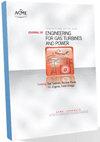燃气轮机跳闸前预警监测方法
IF 2.1
4区 工程技术
Q3 ENGINEERING, MECHANICAL
Journal of Engineering for Gas Turbines and Power-transactions of The Asme
Pub Date : 2023-10-11
DOI:10.1115/1.4063720
引用次数: 0
摘要
当前的能源形势要求燃气轮机(gt)以最大的效率和最高的可靠性运行。Trip是最具破坏性的事件之一,它会降低GT的可用性并增加维护成本。为了应对GT行程预测的挑战,本文提出了一种方法,其目标是监测GT运行期间提出的早期预警,并触发警报以避免发生跳闸。该方法利用了一个自动编码器(预测模型)和一个三阶段准则(检测程序)。首先对自动编码器进行训练,以重建安全运行数据,然后对发生跳闸前收集的新数据进行测试。跳闸检测标准检查单独测试的数据点是否应该被分类为正常或异常(第一阶段),如果在给定时间范围内的异常分数超过阈值(第二阶段),则提供警告(第二阶段),最后,结合连续警告来提前触发跳闸警报(第三阶段)。该方法应用于一个实际案例研究,该研究由几年来从各种运行中的gt收集的一系列起下钻组成,其中的原因可能不同。分析采用了起下钻前3天GT作业期间的气路历史观测数据。经过优化后,该方法可在起下钻发生前至少10小时提供可靠性为75%的起下钻警报。本文章由计算机程序翻译,如有差异,请以英文原文为准。
Methodology to Monitor Early Warnings Before Gas Turbine Trip
Abstract The current energy scenario requires that gas turbines (GTs) operate at their maximum efficiency and highest reliability. Trip is one of the most disrupting events that reduces GT availability and increases maintenance costs. To tackle the challenge of GT trip prediction, this paper presents a methodology that has the goal of monitoring the early warnings raised during GT operation and trigger an alert to avoid trip occurrence. The methodology makes use of an autoencoder (prediction model) and a three-stage criterion (detection procedure). The autoencoder is first trained to reconstruct safe operation data and subsequently tested on new data collected before trip occurrence. The trip detection criterion checks whether the individually tested data points should be classified as normal or anomalous (first stage), provides a warning if the anomaly score over a given time frame exceeds a threshold (second stage), and, finally, combines consecutive warnings to trigger a trip alert in advance (third stage). The methodology is applied to a real-world case study composed of a collection of trips, of which the causes may be different, gathered from various GTs in operation during several years. Historical observations of gas path measurements taken during three days of GT operation before trip occurrence are employed for the analysis. Once optimally tuned, the methodology provides a trip alert with a reliability equal to 75% at least ten hours in advance before trip occurrence.
求助全文
通过发布文献求助,成功后即可免费获取论文全文。
去求助
来源期刊
CiteScore
3.80
自引率
20.00%
发文量
292
审稿时长
2.0 months
期刊介绍:
The ASME Journal of Engineering for Gas Turbines and Power publishes archival-quality papers in the areas of gas and steam turbine technology, nuclear engineering, internal combustion engines, and fossil power generation. It covers a broad spectrum of practical topics of interest to industry. Subject areas covered include: thermodynamics; fluid mechanics; heat transfer; and modeling; propulsion and power generation components and systems; combustion, fuels, and emissions; nuclear reactor systems and components; thermal hydraulics; heat exchangers; nuclear fuel technology and waste management; I. C. engines for marine, rail, and power generation; steam and hydro power generation; advanced cycles for fossil energy generation; pollution control and environmental effects.

 求助内容:
求助内容: 应助结果提醒方式:
应助结果提醒方式:


